“Today’s the day.” I finally decided. “Today’s the day that I finally write the thing I have been wanting to write ever since Jesse Fletcher wrote about his love for Blood Rage so, so long ago.”
After reading Jesse’s impassioned words, it got me thinking about games that I loved and, more specifically, this game. Lewis and Clark is just one of those games that speaks to me on so many levels and with good reason. There’s a lot to love. It’s taken me a while to get here, but I’ve finally arrived.
I Love How I Discovered It
It all started like this.
2013 was a big year for me. After a long period of just gaming as a couple, my wife and I decided we were ready to branch out and find some new people to play with. So, it was with a great sense of trepidation that we finally took the plunge and joined a local game group. When we began that journey, I only owned a handful of games: my well loved copy of Carcassonne, a bedraggled first edition of The Settlers of Catan, a first edition of Agricola, and three or four other assorted titles. But that first night spent with that gaming group set me down a path that I still travel to this day. On our second or third visit there, we were introduced to Dominion and I became so enamored with the game that I felt the urge to write and post a review for it. I have been writing reviews ever since.
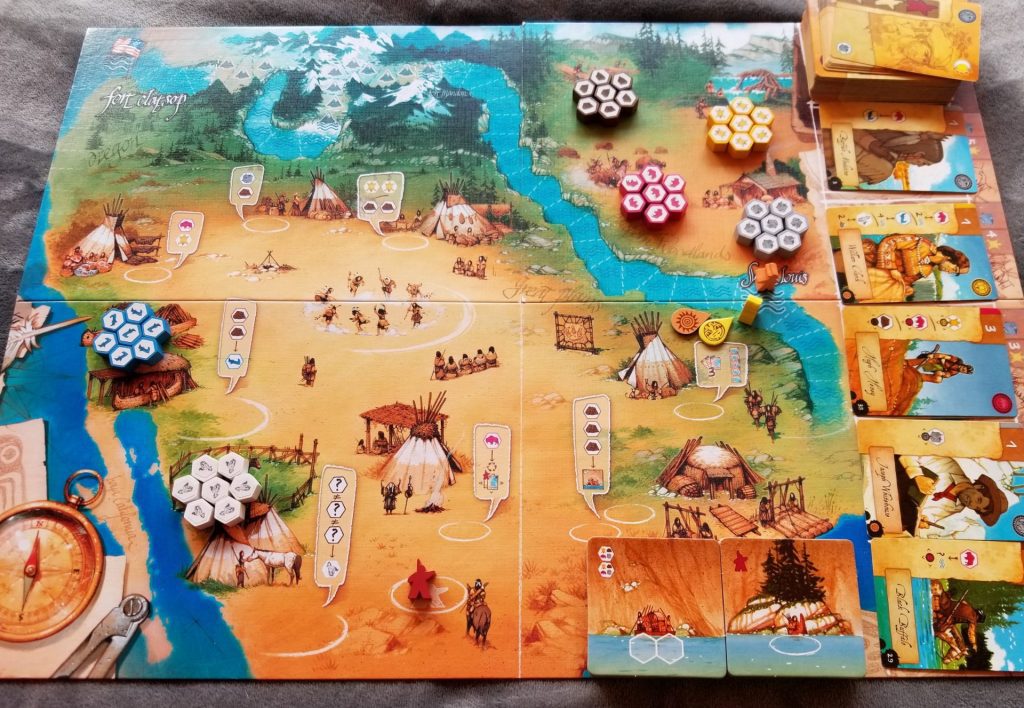
As my catalog of reviews expanded, so too did my collection of games. And it just kept on growing. Just when I thought I had all the games I’d ever need, something new and fascinating would come along and I’d want it, too. And so it was during the Christmas of 2014 when I received a $25 Amazon gift card as a gift. Logically, there was only one thing to do with it. The question was: which game should I buy?
Poring over the thousands of titles on Amazon, I just couldn’t make up my mind. It was total information overload. I wanted it all and that made it really hard to pick just one. In times like these where I am presented with so many equally good options that I find myself standing at an indecision crossroads, I’ll make a list and roll a die and just go with whatever the random whims of fate have decided. But where to get a list? There were far too many games out there for me to generate a list of my own. I needed guidance. I needed divine intervention. I needed inspiration.
I needed to run a contest.
The end result of that contest was Lewis and Clark.
I Love The Rule Book
From the moment you open the rule book to this game, you become a willing captive to the Lewis and Clark universe. The story on top of its historic backdrop draws you in and piques your interest as you begin your own expedition of discovery through the game and its various mechanisms. Each page is large and open, the text never jumbled together. Every new concept is accompanied by an image detailing an example of the new concept at work.
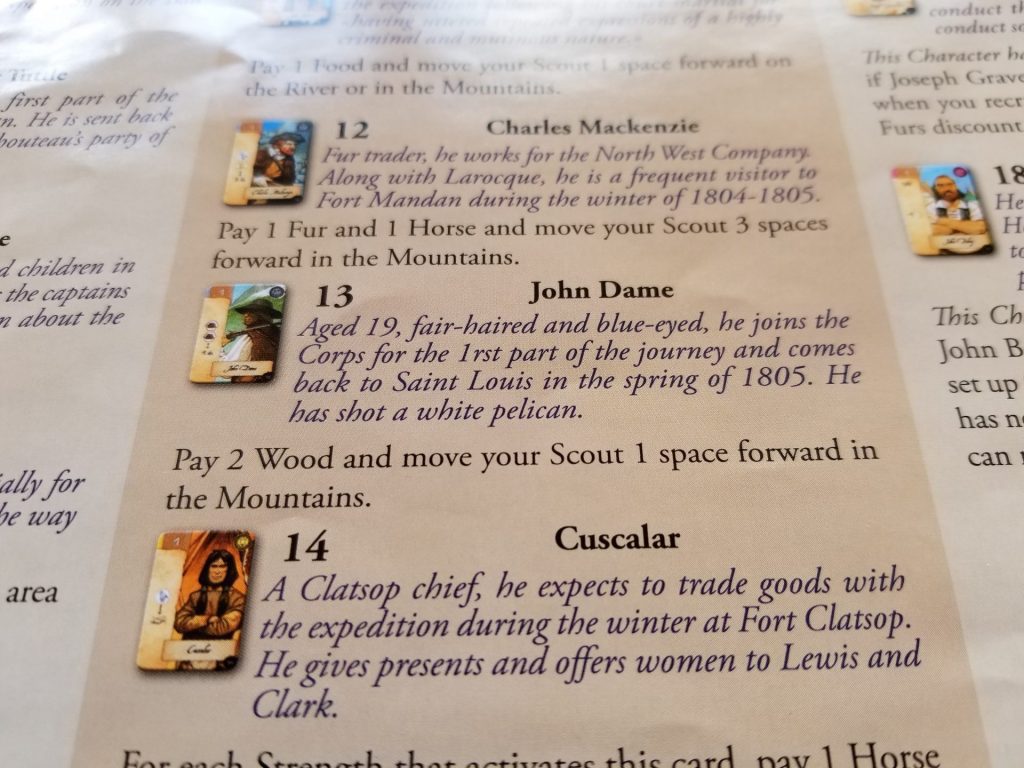
And starting on page 10 is what really makes this rule book shine. In a totally unnecessary (but welcome) move, the designer opted to include a historical appendix of the characters the players will encounter via the cards during the course of the game. Each card is numbered for easy reference. So if you find yourself holding John Dame, for instance, you can easily consult the rulebook for #13 and discover:
“John Dame: Aged 19, fair-haired and blue-eyed, he joins the Corps for the first part of the journey and comes back to Saint Louis in the spring of 1805. He has shot a white pelican.
Pay 2 Wood and move your Scout 1 space forward in the Mountains.”
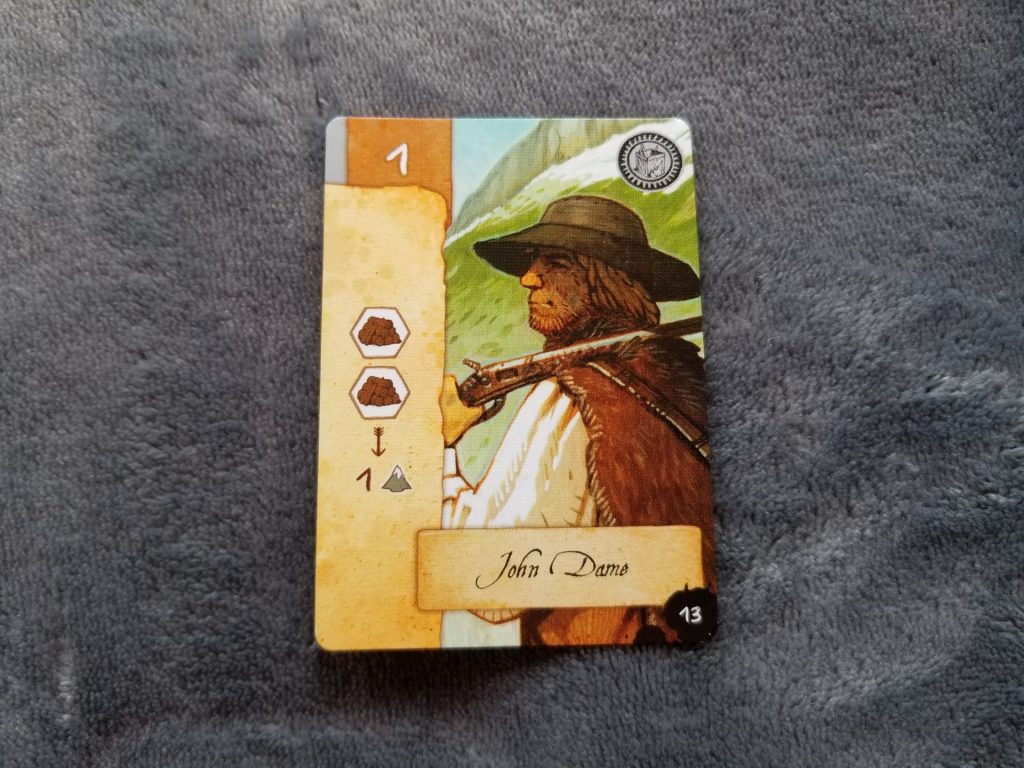
While that second part is absolutely needed (there is a metric ton of iconography in this game), that first part really isn’t. But there is no denying its Wes Anderson-esque charm. John Dame becomes more than just a card in your hand. He was an actual person that played an integral role in Lewis and Clark’s journey and these little character vignettes remind you of this… and Lewis and Clark is the better for it.
Lewis and Clark’s rule book stands as a perfect ideal that every rule book should strive for. From the writing to the layout to the graphic design, it is truly a thing of beauty.
I Love The Components
There’s no denying the satisfaction of playing a well-produced game and Lewis and Clark has got that in spades. The cardboard is thick and sturdy, the rule book is large and glossy, the wooden pieces chunky with colors chosen for color blind friendliness instead of the usual assortment of primary colors. The cards have a nice linen finish which lends them a satisfying snap.
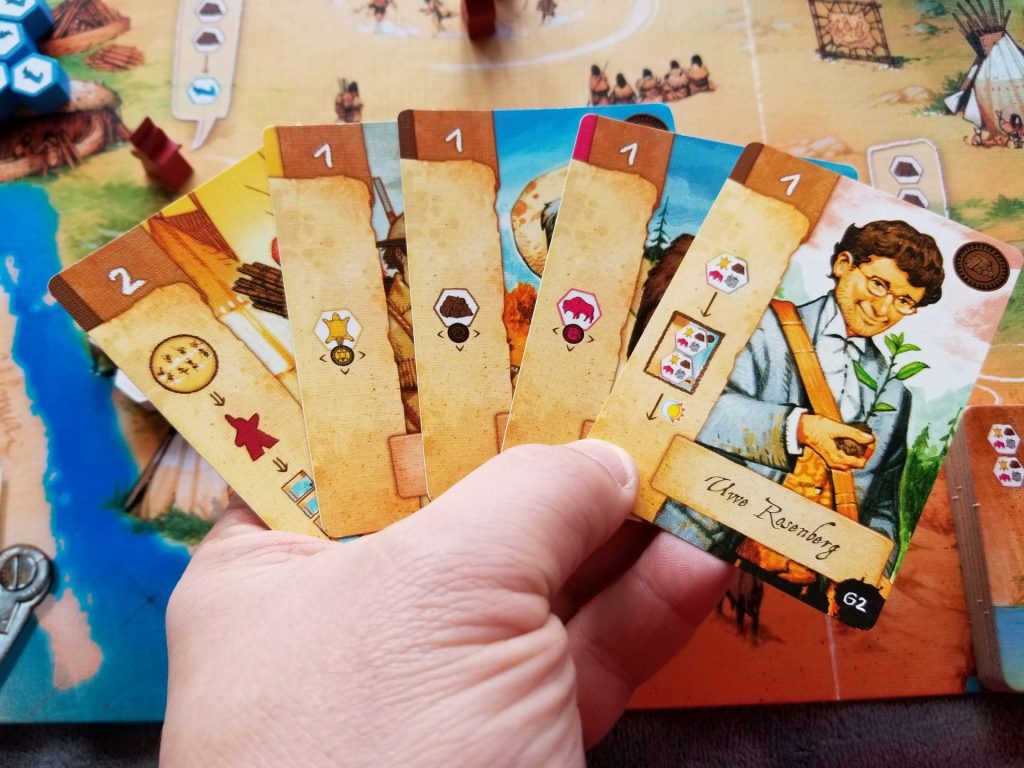
Even the box insert is well constructed with indentations and wells to hold everything in place. I have stored this game both vertically and horizontally with no discernible difference. Everything fits tightly enough together that everything stays where it’s supposed to when the game is not in use.
I Love The Mechanics
Lewis and Clark has a healthy dose of a lot of different game mechanics that I enjoy. It has:
– Worker Placement: Each player has access to a workforce of Native Americans that they can send into the local village to trade for the items that are going to be needed for the journey ahead and to purchase cards to add to their deck.
– Hand Management: The cards in your hand are your lifeblood. They’re the primary way that you’ll be gaining resources and how you’ll be moving up the river and over any mountains you may encounter. Because that’s the ultimate goal in Lewis and Clark; get to the end of the river first and win the game. One of the really unique aspects of the resource gathering cards is that they earn you resources based on how many of a particular symbol are visible not only in your own playing area, but those of your neighbors as well.
– Deck Building: Well, not deck building in the classic Dominion sense. While you are technically adding cards to your deck, your unplayed cards are always available to you. Once you use them, however, they cannot be gathered up again until you decide to ‘camp’. In addition to being how you gather up your used cards, camping is also how you save your progress up the river. You’ve got a camp marker that marks where you were the last time that you camped and will be brought up to where you currently are once you camp again.
– Resource Management: Each player will be building up and managing a fleet of canoes that hold certain types or amounts of resources. If those resources don’t get spent wisely, then they might cost the player valuable time when that player decides to camp, causing them to move backwards on the river!
– Point to Point Movement: Your primary objective is to move up the river as quickly and efficiently as possible. However, not all movement is the same. It costs different types of movement icons to move over water than it does to climb over mountains. One of the tools in your arsenal is that if you end your movement on the same space as someone else, you actually move to the next space in line. If enough people are lined up on your turn, you can potentially skate ahead several extra spaces for free if you play your cards just right.
Lewis and Clark’s superb design blends these disparate mechanics together into a tasty, board game smoothie for the soul.
I Love The Theme
I have been obsessed with Lewis and Clark ever since I was a young boy. I grew up (and still live in) Tennessee just a few hours’ drive from the location where Merriwether Lewis met his mysterious end. Unsolved mysteries have always been my jam. I can clearly recall many sleepless nights after having listened to Robert Stack expound upon some unsolved crime from the past on the television earlier in the evening. Equal parts terrifying, equal parts mesmerizing, there was no denying their call. So, when I learned about Lewis’s death, it also sparked a curiosity about his life… and what a life it was.
The Lewis and Clark expedition is a fascinating topic made all the more fascinating by the detailed journals kept by its party members. For as much good as they did—building diplomatic ties with multiple Native American populations, chronicling the flora and fauna of an undiscovered country (at least by the people on and paying for the Lewis and Clark expedition), mapping out trade routes and the overall geography—they also did a lot of harm. Lewis and Clark weren’t perfect people. They brought their biases and moral compasses with them and those compasses weren’t always pointed in the right direction.
It’s rare that I play a game that incorporates the theme so well. Even most of the characters you’ll encounter have abilities that have been developed around what they actually did for the expedition in real life. That’s pretty awesome!
I Love The Visuals
Lewis and Clark was my very first introduction to the amazing work of the venerable Vincent du Trait. His use of vibrant colors, hard lines, and mixed media makes the game sing. One could spend hours just going through the cards staring at the detailed illustrations and backgrounds. And there are 84 of them, each as lovingly crafted as the others. His work in Lewis and Clark is more than just artwork for a game. It’s an experience.
I Love Its Simplicity
Even with all of the various mechanics that I listed earlier, Lewis and Clark is not a complicated game. The end goal is clearly defined and the way that you get there is easy to describe. Lewis and Clark is a game that can be taught in a matter of minutes. And despite this simplicity, it’s just as challenging for more seasoned boardgaming veterans as it is for newcomers.
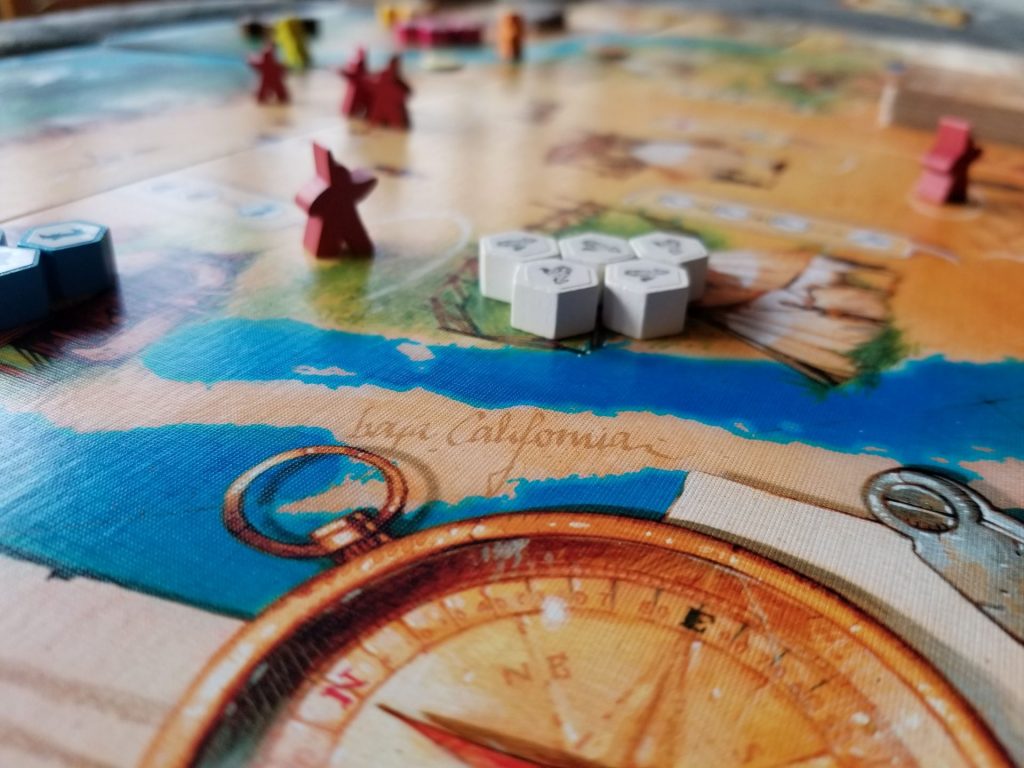
And if you find the game too challenging as-is (or perhaps not challenging enough, you masochist!), you can even tailor it to fit your needs. Included in the box are a number of tiny, double-sided tiles featuring water spaces on one side and mountain spaces on the other. Now you can just turn the game into a straightforward race down the river (perfect for introducing smaller children to the game) or throw some more mountains into your path (for more advanced players looking for a challenge). This high degree of easy customization is just another feather in Lewis and Clark’s cap.
I Even Love The Solitaire Mode
I loathe playing board games solo. One of the things I love the most about this hobby is the social aspect and solitary gaming always leaves me with a hollow feeling, wishing I were playing with someone else. Another thing that I dislike about playing board games solo is that most solo AIs require a bunch of extra setup and have a lot of convoluted rules and processes that I have to learn on top of everything else.
Not so with Lewis and Clark. In Lewis and Clark’s solo mode you’re racing against the AI, Alexander Mackenzie (who was an actual person, his story told in the rule book, of course!). Alexander does one thing on his turn. He moves up the river a single space. That’s it.
Despite those simple instructions, it’s a real challenge. While you’re busy trying to gather the resources and recruit the characters needed to move along the river, even a few spaces, Alexander chugs merrily along without a care in the world. You’ve got to be quick if you want to win. And if you find yourself winning too often, you can toss a few mountains in your path or adjust how many spaces he moves on his turn (or if you’re into torture, both).
Whenever someone asks for great games to play solo, I always recommend Lewis and Clark.
There is literally nothing not to love about this magnificent game other than the fact that it’s getting harder to find. I count my lucky stars that it was recommended to me and I commend my past self for listening and taking the plunge into Lewis and Clark sight unseen. Buying a game you’ve never played before and know virtually nothing about based solely on the recommendation of a stranger is always a gamble. But in this instance, the gamble paid off.


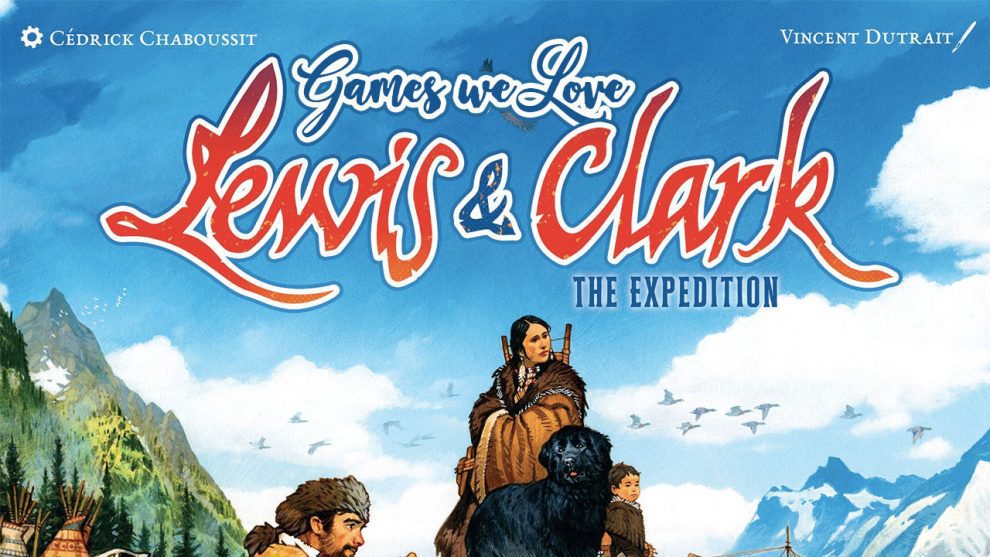


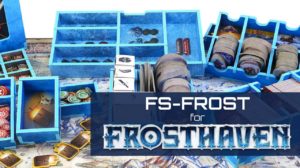
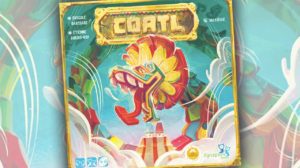





Add Comment